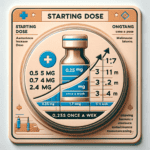
Can Semaglutide Cause High Blood Pressure?
Can Semaglutide Cause High Blood Pressure? Semaglutide is a medication that is commonly used to treat type 2 diabetes. It belongs to a class of drugs called glucagon-like peptide-1 receptor agonists (GLP-1 RAs), which work by increasing insulin secretion and reducing glucose production in the body.
However, recent research has suggested that semaglutide may also have potential benefits for individuals with hypertension, or high blood pressure.
Hypertension (high blood pressure) is a common condition that affects millions of people worldwide. It occurs when the force of blood against the walls of the arteries is consistently too high.
This can lead to serious health complications, including heart disease, stroke, and kidney problems. Understanding the link between semaglutide and hypertension is important because it could provide new treatment options for individuals with both conditions.
Understanding Hypertension: Causes and Symptoms
Hypertension, also known as high blood pressure, is defined as having a systolic blood pressure (the top number) of 130 mmHg or higher, or a diastolic blood pressure (the bottom number) of 80 mmHg or higher. There are several factors that can contribute to the development of hypertension, including genetics, age, obesity, lack of physical activity, excessive salt intake, and chronic conditions such as diabetes and kidney disease.
Symptoms of hypertension are often silent, meaning that individuals may not experience any noticeable signs until the condition has progressed to a more advanced stage. However, some common symptoms include headaches, dizziness, shortness of breath, chest pain, and nosebleeds. If left untreated, hypertension can lead to serious complications such as heart attack, stroke, heart failure, and kidney disease.
What is Semaglutide and How Does it Work?
Semaglutide is a GLP-1 RA that works by mimicking the effects of a hormone called glucagon-like peptide-1 (GLP-1) in the body. GLP-1 is naturally produced in the intestines and helps regulate blood sugar levels by stimulating insulin secretion and reducing glucagon production. By activating GLP-1 receptors, semaglutide helps lower blood sugar levels and improve glycemic control in individuals with type 2 diabetes.
Semaglutide is typically administered as a once-weekly injection and is available in different dosages. The recommended starting dose is usually 0.25 mg per week, which can be increased to 0.5 mg per week after four weeks if needed. Some individuals may require a higher dose of 1 mg per week to achieve optimal glycemic control.
The Link Between Semaglutide and Hypertension: What the Research Says
Several studies have been conducted to investigate the potential link between semaglutide and hypertension. One study published in the New England Journal of Medicine in 2017 found that semaglutide was associated with a significant reduction in blood pressure compared to placebo in individuals with type 2 diabetes. The study included over 3,000 participants and showed that semaglutide not only improved glycemic control but also had beneficial effects on blood pressure.
Another study published in Diabetes Care in 2019 examined the effects of semaglutide on blood pressure in individuals with obesity and without diabetes. The study found that semaglutide treatment resulted in a significant reduction in systolic and diastolic blood pressure compared to placebo. These findings suggest that semaglutide may have potential benefits for individuals with hypertension, regardless of whether they have diabetes or not.
It is important to note that while these studies suggest a potential link between semaglutide and hypertension, more research is needed to fully understand the relationship between the two. Additionally, it is important to consider individual factors such as age, weight, and overall health when determining the appropriate treatment options for individuals with hypertension.
Debunking Myths About Semaglutide and High Blood Pressure

Generic Semaglutide
There are several common misconceptions about semaglutide and its potential effects on hypertension. One myth is that semaglutide can cause high blood pressure. While it is true that some individuals may experience an increase in blood pressure when starting semaglutide, this is usually temporary and resolves over time. In fact, as mentioned earlier, research has shown that semaglutide may actually have a beneficial effect on blood pressure.
Another myth is that semaglutide is only effective for individuals with diabetes and not for those with hypertension alone. While semaglutide is primarily used to treat type 2 diabetes, studies have shown that it may also have potential benefits for individuals with hypertension, regardless of whether they have diabetes or not. This suggests that semaglutide could be a promising treatment option for individuals with both conditions.
It is important to separate fact from fiction when considering the potential benefits of semaglutide for hypertension. Consulting with a healthcare provider is crucial in order to make informed decisions about treatment options and to address any concerns or misconceptions.
Risks and Benefits of Semaglutide for Hypertension Patients
Like any medication, semaglutide comes with potential risks and side effects. Common side effects of semaglutide include nausea, vomiting, diarrhea, and constipation. These side effects are usually mild and resolve over time. However, in rare cases, more serious side effects such as pancreatitis and kidney problems may occur. It is important to discuss the potential risks and benefits of semaglutide with a healthcare provider before starting treatment.
The potential benefits of semaglutide for hypertension patients include improved glycemic control, weight loss, and potential reductions in blood pressure. Semaglutide has been shown to help individuals with type 2 diabetes achieve better blood sugar control and lose weight. Additionally, studies have suggested that semaglutide may have beneficial effects on blood pressure, which could be particularly beneficial for individuals with hypertension.
It is important to weigh the potential risks and benefits of semaglutide for each individual patient. A healthcare provider can help determine if semaglutide is a suitable treatment option based on the patient’s overall health, medical history, and individual needs.
How to Manage Hypertension While Taking Semaglutide
For individuals with hypertension who are considering taking semaglutide, it is important to manage blood pressure effectively. This can be done through lifestyle modifications such as maintaining a healthy diet, engaging in regular physical activity, limiting alcohol consumption, reducing salt intake, and managing stress.
Monitoring blood pressure regularly is also crucial. This can be done at home using a blood pressure monitor or by visiting a healthcare provider for regular check-ups. It is important to work closely with a healthcare provider to ensure that blood pressure is well-controlled while taking semaglutide.
Semaglutide and Hypertension: What Doctors Need to Know

The Science Behind Semaglutide
For healthcare providers prescribing semaglutide to patients with hypertension, there are several considerations to keep in mind. It is important to assess each patient’s individual risk factors, medical history, and overall health before prescribing semaglutide. Monitoring blood pressure regularly and adjusting the dosage of semaglutide if necessary is also crucial.
Additionally, healthcare providers should educate patients about the potential benefits and risks of semaglutide for hypertension. This includes discussing lifestyle modifications, monitoring blood pressure, and addressing any concerns or misconceptions that patients may have.
Future Research Directions for Semaglutide and High Blood Pressure
While the current research suggests a potential link between semaglutide and hypertension, there is still much to learn about this relationship. Future research should focus on further investigating the effects of semaglutide on blood pressure in individuals with hypertension, both with and without diabetes.
Additionally, more studies are needed to determine the long-term effects of semaglutide on blood pressure and overall cardiovascular health. This will help provide a more comprehensive understanding of the potential benefits and risks of semaglutide for individuals with hypertension.
Conclusion: Can Semaglutide Cause High Blood Pressure?
In conclusion, semaglutide shows promise as a potential treatment option for individuals with hypertension. While more research is needed to fully understand the link between semaglutide and hypertension, current studies suggest that semaglutide may have beneficial effects on blood pressure.
It is important for patients and healthcare providers to consider semaglutide as a treatment option for hypertension, particularly in individuals with type 2 diabetes. However, it is crucial to weigh the potential risks and benefits of semaglutide for each individual patient and to work closely with a healthcare provider to ensure that blood pressure is well-controlled while taking semaglutide.
Overall, semaglutide represents an exciting development in the field of hypertension treatment, and further research is needed to fully explore its potential benefits for individuals with this condition.






